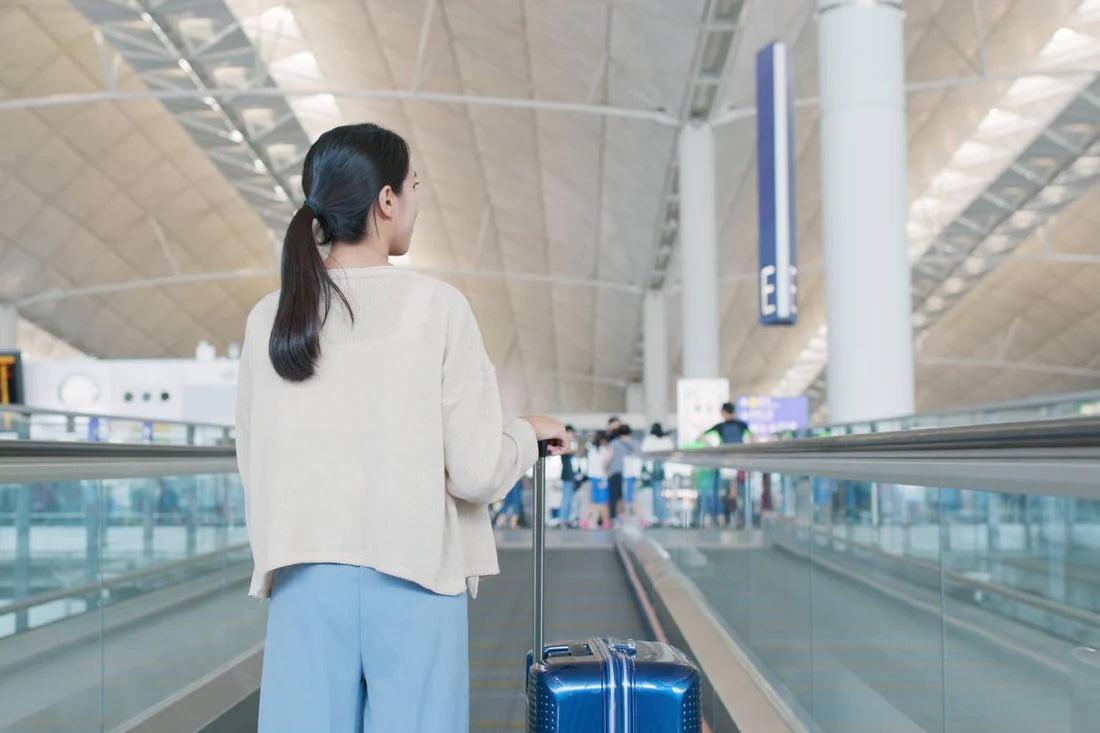PREGNANCY
Pregnancy and Travel: Eating Healthy on the Go
Stay full and fueled throughout your journey.

Written by
Happiest Baby Staff

Traveling while pregnant is…an adventure! It’s now super-uncomfortable to sit for long stretches. There are all those additional bathroom breaks—or, perish the thought, puke breaks—to deal with. Then you need to figure out how to eat healthy in airports, planes, or at highway rest stops. Adding insult to injury, “pregnancy slows motility in the gut to help maximise nutrient absorption, which is a great thing,” says registered dietitian Dana White, MS, RD, co-author of The Whole 9 Months. “But that slow-down also predisposes pregnant individuals to constipation during travel.” Changes in fluid balance from air travel—or just the change in your eating routine—can certainly add to this, as well. It’s enough to make a pregnant traveler want to stay home! But before you put your luggage back in storage, learn why eating on-the-go can prove tricky for those who are expecting—and how to eat healthy while both traveling during pregnancy.
Traveling While Pregnant: How Flying Impacts Digestion
Pregnancy makes you more prone to bloating thanks to an uptick in the hormone progesterone relaxing the muscles in your digestive tract. Being pregnant on a plane, however, increases your odds of bloat even more. The difference between the atmospheric pressure on a plane—and the air pressure in your body—causes the air in your tummy to expand, bringing on more uncomfortable gas and bloating. At the same time, pregnancy makes you more likely to become dehydrated—and so does flying! (Airplane air is almost completely devoid of moisture.) The good news? You can counterbalance these belly woes by tailoring your flying-while-pregnant diet.
Eat These Foods When Flying Pregnant
Pro tip: Eat before you arrive at the airport, no matter what time your flight is. Shoot for a nutritious mix of lean protein, healthy fat, and carbs that are high in fiber. This will help you feel full longer, so you’re better able to resist less-than-healthy airport food. Then, these are some good options for the plane:
- Fruit: “Pack sturdy fruits and veggies like apples, oranges, and carrot sticks that won’t get crushed to mush in your bag,” says White. “Dried fruit is a good option, too.”
- Water: Low humidity in the airplane can easily cause you to become dehydrated. Plus, sitting for long stretches increases your risk of deep vein thrombosis (DVT), which is when a dangerous blood clot forms, usually in the leg. But drinking lots of water helps to stave off both. To ensure you’re getting enough, stash an empty insulated water bottle in your carry-on to fill once you get through security.
- Lean Protein: Eating lean proteins like turkey or chicken fills you up without the unhealthy downsides of slow-to-digest high-fat proteins.
- “Specialty” Meals: If you are on a long flight that includes a meal, inquire about securing a low-sodium, low-sugar, or vegetarian meal ahead of time.
- Protein-Rich Snacks: Unsalted nuts, hard cheese, hummus, trail mix, roasted chickpeas, pumpkin seeds, peanut butter-filled whole wheat crackers are not only satisfying, they help keep hunger at bay longer.
- Bagged Lunch: Consider packing a mini soft-sided cooler with fully-frozen gel ice packs, filled with your own from-home meal. “Pack something nutrient- and fiber-rich that helps curb hunger and battle any potential for constipation,” says White.
Skip These Foods When Flying Pregnant
While it’s tempting to grab something—anything—quick and easy to eat at the airport, making the wrong choice can leave you feeling uncomfortable on your flight. For a smooth flight, it’s best to bypass the following food and beverages when pregnant:
- Salty Food: Sodium causes your body to retain water, spurring even more travel/pregnancy bloat.
- Gassy Foods and Drinks. It’s true that high-fiber foods like lentils, broccoli, and beans help with pregnancy constipation, but eating them before flying can easily lead to uncomfortable bloat and embarrassing toots. (Same goes for carbonated drinks.)
- Greasy, Fatty Foods: French fries, burgers, fried chicken—if it’s greasy you should avoid it. Greasy foods (especially ones that are high in fat and salt) are difficult to digest and can lead to fluid retention.
- Coffee: Caffeine is dehydrating, it stimulates colon muscle (which increases the need to poop), it’s a diuretic (which increases the need to pee), and it ups the acid in your stomach, which can lead to an upset tummy and heartburn—none of which you want to deal with on a flight!
Traveling While Pregnant: How Long Drives Impact Digestion
Constipation is a common, unpleasant side effect of pregnancy and long car rides. According to experts from Harvard University, sitting for hours in the car, a disrupted schedule, and having your usual diet upended are leading causes of travel constipation. But there are some pre-travel and on-the-road steps you can take to avoid pregnancy- and travel-related constipation, like this…
Road Trip While Pregnant: Healthy Eating Tips
Unlike with air travel, there are zero restrictions on what foods and beverages you can stow in your car—and you’ll have more room to keep a big cooler by your side as well. Take advantage by eating and drinking the following on your next pregnancy road trip:
- Increase fiber intake. In the weeks leading up to your travel, make sure you’re including plenty of fiber-rich fruits, veggies, and whole grains in your diet to help stave off road trip-induced constipation. (If you’re not used to eating a lot of fiber, don’t overdo it or you could wind up bloated and gassy.)
- Bring plenty of water. You’ll need it to help prevent dehydration, constipation, and deep vein thrombosis. Any type of travel lasting 4 hours or more doubles the risk of DVT—and being pregnant is an extra risk factor, too. You should drink 8 to 12 cups (64 to 96 ounces) of water every day during pregnancy—whether road tripping or not! (Don’t forget to map out bathroom stops along the way.)
- Curb car sickness with snacks. While being pregnant won’t make you suddenly car sick, if you have morning sickness, traveling may make it worse. To help, snack on crackers and other bland foods that are low in fat and easy to digest, like dry cereal and bananas, throughout your car ride. Regular snacking keeps your stomach from being empty, which helps prevent nausea. Learn more dietitian-approved tips for calming morning sickness with food.
- Put this in your cooler. “You want to fill your cooler with nutrient- and fiber-rich choices to help curb hunger and constipation,” says White. “I like to pack peanut butter and fruit or nut-butter and jelly sandwiches on whole grain bread.” When you have the luxury of a cooler, go ahead and stash healthy eats like Greek yogurt, string cheese, and hummus, too. “These, plus a trail mix with a combo of nuts, seeds, and dried fruit, are some of my go-to snacks to help provide plenty of protein and nutrients that are vital to a healthy pregnancy—and easy to travel with,” was White. (Keep some ginger ale made with real ginger in the cooler, too. It’ll help with nausea.)
- Map out food pit stops. Instead of eating in the car, plan for regular stops where you can stretch your legs and eat. Walking and stretching at regular intervals aids digestion and helps to prevent DVT, notes ACOG. Even if you brought meals and snacks with you, it’s a good idea to locate healthy food spots along your route, just in case. “Shy away from a lot of fast foods that may exacerbate stomach upset and trigger heartburn,” says White. “Instead, opt for healthier items that contain lean protein.” White suggests scanning online menus before hitting the road. “Restaurants like Chipotle and Starbucks offer healthier options, plus have robust online calculators where you can check and manage the nutrition ahead of time,” she says.
***
REFERENCES
- Kaiser Permanente: Constipation and Gas in Pregnancy
- Houston Methodist: 10 Things That Lead to Digestive Problems While Traveling
- The Centers for Disease Control and Prevention (CDC): Heat – Reproductive Health
- Cleveland Clinic: How Airplane Travel Affects Your Body
- American Academy of Obstetrics and Gynecology (ACOG): Travel During Pregnancy
- Transportation Security Administration: What Can I Bring?
- Unity Point Health: Things That Make You Swell When You're Pregnant
- Mayo Clinic: Is it safe to fly during pregnancy?
- UCSF Health: Coping With Common Discomforts of Pregnancy
- MedlinePlus: Caffeine
- Harvard Medical School: Travel tummy troubles: Here's how to prevent or soothe them
- ACOG: How much water should I drink during pregnancy?
- March of Dimes: Morning sickness
Disclaimer: The information on our site is NOT medical advice for any specific person or condition. It is only meant as general information. If you have any medical questions and concerns about your child or yourself, please contact your health provider. Breastmilk is the best source of nutrition for babies. It is important that, in preparation for and during breastfeeding, mothers eat a healthy, balanced diet. Combined breast- and bottle-feeding in the first weeks of life may reduce the supply of a mother's breastmilk and reversing the decision not to breastfeed is difficult. If you do decide to use infant formula, you should follow instructions carefully.
SHARE THIS ARTICLE
PARENT PICKS
Bestsellers



















